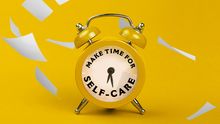
We are currently experiencing extraordinary and uncertain times. The ramifications associated with the coronavirus (COVID-19) are changing daily and we are bombarded with constant news and discussions on TV and social media. Even our email inbox is being flooded with regular messages about the coronavirus and steps we should take (I received 5 email messages while writing this article!). However, even though having a sound knowledge about the changing circumstances and sensible precautions we should take are helpful, an excess focus on the coronavirus can be harmful to our mental health.
When we spend time focusing on negative messages, fear centres in our brain become triggered which results in a cascade of hormonal changes in our body. In particular, concentrations of cortisol, one of our stress hormones, increase which places our body in the ‘fight or flight’ response. This can then make us more sensitive to other negative messages or experiences that occur during the day. Our mind and body become over-sensitised to bad news. Therefore, developing strategies to lower cortisol and increase feel-good hormones are extremely important. Below are some suggestions on how to take care of your mental and physical wellbeing during current times.
To help you implement some of the recommendations above, download this free self-care checklist and keep a daily record of how you are going. Remember that although ‘problem solving’ about the coronavirus can helpful ‘obsessing’ about it is not. Balance is the key, so listen to your body. If you are experiencing significant anxiety, worry, or sadness, then it is time to increase your self-care. Also remember to seek support from a health professional, if your symptoms are worsening.
Session expired
Please log in again. The login page will open in a new tab. After logging in you can close it and return to this page.
Great reminder to take better care of ourselves, to help in turn protect our health. I’ve always said that stress (and thus chronically raised cortisol) is the invisible enemy that we can’t see until we start getting physical or psychological manifestations. Also, I’m glad you incorporated gratitude in your self care checklist; often doesn’t get enough credit!